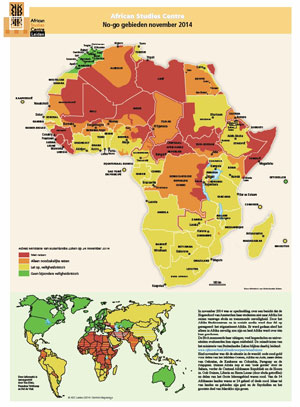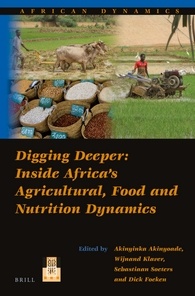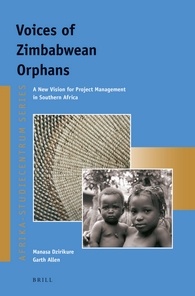New publications
New publications by ASCL staff and affiliates, and new books in our series, are frequently highlighted on this website. You may also use this RSS feed to keep informed. All recently added publications can be found in our database.
 Turkey has recently been showing increased interest in developing strong relations with African countries. The relatively new trend builds on the synergy of multiple public and private actors and Ankara has resorted to an arsenal of soft power instruments. Thus, development aid, humanitarian assistance and Islamic solidarity are strongly entwined with diplomacy and trade. Read this ASC Infosheet online or order a copy!
Turkey has recently been showing increased interest in developing strong relations with African countries. The relatively new trend builds on the synergy of multiple public and private actors and Ankara has resorted to an arsenal of soft power instruments. Thus, development aid, humanitarian assistance and Islamic solidarity are strongly entwined with diplomacy and trade. Read this ASC Infosheet online or order a copy!
 ASC senior researcher Benjamin Soares has a new co-edited volume out: New Media and Religious Transformations in Africa. The book analyzes Africa's rapidly evolving religious media scene. Following political liberalization, media deregulation and the proliferation of new media technologies, many African religious leaders and activists have appropriated such media to strengthen and expand their communities and gain public recognition. Media have also been used to marginalize and restrict the activities of other groups, which has sometimes led to tension, conflict, and even violence.
ASC senior researcher Benjamin Soares has a new co-edited volume out: New Media and Religious Transformations in Africa. The book analyzes Africa's rapidly evolving religious media scene. Following political liberalization, media deregulation and the proliferation of new media technologies, many African religious leaders and activists have appropriated such media to strengthen and expand their communities and gain public recognition. Media have also been used to marginalize and restrict the activities of other groups, which has sometimes led to tension, conflict, and even violence.
 Het ASC heeft een nieuwe themakaart geproduceerd: 'No-go' gebieden 2014. Deze uitgave bevat een kaart van Afrika én een kaart van de wereld waarop veilige en onveilige gebieden te zien zijn, gebaseerd op de reisadviezen van het ministerie van Buitenlandse Zaken. Begin november ontstond er opschudding over een vermeend bericht dat de Hogeschool van Amsterdam haar studenten niet naar Afrika liet reizen vanwege ebola en toenemende onveiligheid. De themakaart toont de situatie op 24 november 2014.
Het ASC heeft een nieuwe themakaart geproduceerd: 'No-go' gebieden 2014. Deze uitgave bevat een kaart van Afrika én een kaart van de wereld waarop veilige en onveilige gebieden te zien zijn, gebaseerd op de reisadviezen van het ministerie van Buitenlandse Zaken. Begin november ontstond er opschudding over een vermeend bericht dat de Hogeschool van Amsterdam haar studenten niet naar Afrika liet reizen vanwege ebola en toenemende onveiligheid. De themakaart toont de situatie op 24 november 2014.
 This volume attempts to dig deeper into what is currently happening in Africa’s agricultural and rural sector. It seeks to convince policymakers and others that it is important to look at the current African rural dynamics in ways that connect metropolitan demands for food with value chain improvements and agro-food cluster innovations. The book has been published by Brill in the African Dynamics Series, the annual publication of the Africa Studies Centre in which a theme is discussed by scholars from all over the world. Editors this year: Yinka Akinyoade, Wijnand Klaver, Dick Foeken and Sebastiaan Soeters.
This volume attempts to dig deeper into what is currently happening in Africa’s agricultural and rural sector. It seeks to convince policymakers and others that it is important to look at the current African rural dynamics in ways that connect metropolitan demands for food with value chain improvements and agro-food cluster innovations. The book has been published by Brill in the African Dynamics Series, the annual publication of the Africa Studies Centre in which a theme is discussed by scholars from all over the world. Editors this year: Yinka Akinyoade, Wijnand Klaver, Dick Foeken and Sebastiaan Soeters.
 This is the first extensive empirical study of Zimbabwean orphans and other vulnerable children and young people. Chronically poor children and their carers can be corrupted or silenced by management systems which fail to recognise their basic human needs. Resilience in the face of such adversity is celebrated by the dominant project management ideology but is a major barrier to achieve sustainable improvements in the lives of vulnerable children. Manasa Dzirikure and Garth Allen propose a new person-centred project management approach.
This is the first extensive empirical study of Zimbabwean orphans and other vulnerable children and young people. Chronically poor children and their carers can be corrupted or silenced by management systems which fail to recognise their basic human needs. Resilience in the face of such adversity is celebrated by the dominant project management ideology but is a major barrier to achieve sustainable improvements in the lives of vulnerable children. Manasa Dzirikure and Garth Allen propose a new person-centred project management approach.
 ASC researcher Akinyinka Akinyoade and Bisola Adebayo from Lagos State University Teaching Hospital, currently drafted to the Ebola Emergency Operations Centre (EEOC) in Lagos, have written an ASC web article about the Ebola outbreak in West Africa and elsewhere. The article goes beyond giving statistical updates of the spread of the Ebola virus; it highlights medical as well as socio-cultural issues, like the strong advise not to shake hands anymore - 'The social soul is now seen as a possible route of transmission of the dreadful disease' -, patients suffering from other diseases getting rejected at medical facilities, and rising foodstuff prices.
ASC researcher Akinyinka Akinyoade and Bisola Adebayo from Lagos State University Teaching Hospital, currently drafted to the Ebola Emergency Operations Centre (EEOC) in Lagos, have written an ASC web article about the Ebola outbreak in West Africa and elsewhere. The article goes beyond giving statistical updates of the spread of the Ebola virus; it highlights medical as well as socio-cultural issues, like the strong advise not to shake hands anymore - 'The social soul is now seen as a possible route of transmission of the dreadful disease' -, patients suffering from other diseases getting rejected at medical facilities, and rising foodstuff prices.
 The ASC has produced three brand new thematic maps. One in cooperation with Nuffic: 'Dutch cooperation programmes to strengthen post-secondary education and training in Africa (1996-2013)', one in cooperation with the Rotterdam School of Management: 'The challenge of Dutch sustainable diplomacy', and one in cooperation with the Netherlands Ministry of Foreign Affairs: 'Composition of financial flows to Sub-Saharan African countries: ten years into the Monterrey Consensus on the Millennium Development Goals'. The maps can be ordered at the ASC, free of charge.
The ASC has produced three brand new thematic maps. One in cooperation with Nuffic: 'Dutch cooperation programmes to strengthen post-secondary education and training in Africa (1996-2013)', one in cooperation with the Rotterdam School of Management: 'The challenge of Dutch sustainable diplomacy', and one in cooperation with the Netherlands Ministry of Foreign Affairs: 'Composition of financial flows to Sub-Saharan African countries: ten years into the Monterrey Consensus on the Millennium Development Goals'. The maps can be ordered at the ASC, free of charge.

